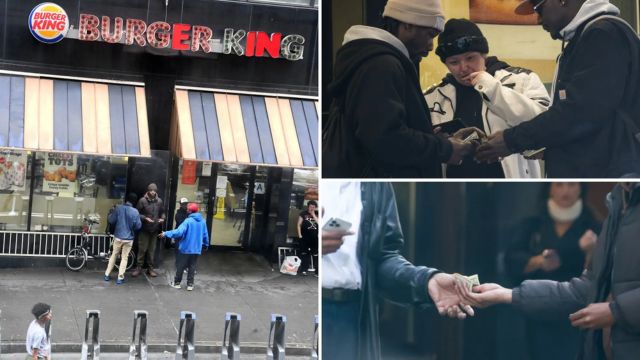NYC Burger King is being sued for $15 million for allegedly letting a “open air drug bazaar” happen
In the heart of New York City, a few blocks from City Hall, a local Burger King has become the focal point of a significant legal battle. The fast-food outlet, located at 106 Fulton Street, is accused of fostering an environment likened to an “open-air drug bazaar,” leading to a $15 million lawsuit filed by Kevin Kaufman, a 20-year resident of the area.
The Manhattan Supreme Court lawsuit alleges that the establishment is a hotspot for illicit activities, with 8 to 10 professional drug dealers using the venue as their operational base. This issue has reportedly plagued the neighborhood, prompting the community’s outcry for intervention.
Kaufman’s legal action sheds light on a grim reality facing the Fulton Street area, as he claims the Burger King has turned into a haven for drug dealers and users. The establishment is accused of allowing the sale of illegal substances both outside its doors and within its premises, particularly during adverse weather conditions.
This situation has purportedly resulted in over 143 emergency calls to 911 linked to the restaurant’s address since the start of 2023, yet the problem persists unabated.
Local residents and business owners express growing concerns over safety and public order, as the presence of this so-called drug bazaar impacts their daily lives and the area’s general atmosphere.
Observations reveal groups obstructing the restaurant’s entry, engaging in intimidating behaviors, and openly conducting drug transactions. This environment has not only deterred regular customers but has also led to an unsettling atmosphere where drug consumption and aggressive behavior are becoming commonplace.
The NYPD has been actively addressing the situation, with more than 600 patrols and community visits reported since 2023. Despite these efforts, the local community feels that more needs to be done to restore order and ensure public safety.
The legal challenge against the Burger King franchise owner, Lalmir Sultanzada, and the Burger King corporate office aims to compel the fast-food chain to take more stringent measures to curb the illegal activities reportedly thriving on its property.
Sultanzada, facing the brunt of the allegations, defends his position by emphasizing the role of law enforcement in managing public safety issues. He argues that private security measures are financially burdensome and beyond his responsibility as a business owner.
The lawsuit, however, insists on the establishment’s accountability, citing New York’s private nuisance law aimed at preventing unreasonable interference with individuals’ enjoyment of their property.
This lawsuit is part of a larger trend of legal actions targeting businesses over crime and safety concerns. Instances from across the country, including lawsuits against major retailers like Target and 7-11, highlight a growing demand for businesses to play a proactive role in maintaining a safe environment for their customers and surrounding communities.
The case against the Fulton Street Burger King not only represents a local dispute but also underscores broader issues concerning urban crime, public safety, and the responsibilities of business owners in addressing these challenges.
As the legal proceedings unfold, the outcome of this lawsuit may set a precedent for how businesses are expected to contribute to the safety and well-being of their neighborhoods. The community’s plea for a safer environment echoes the sentiment of urban dwellers everywhere, calling for collaborative efforts to reclaim their streets from crime and disorder.











